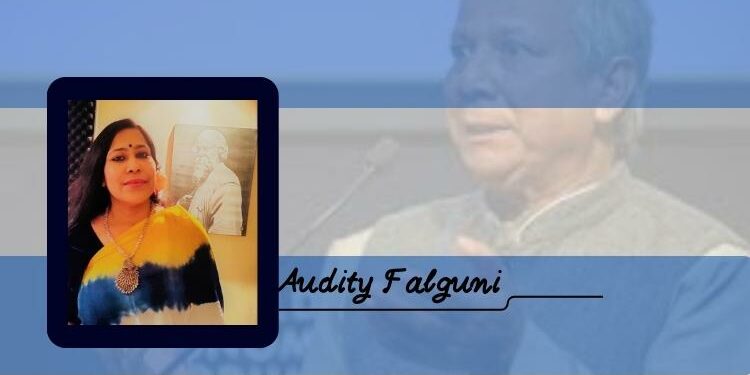‘From the time my husband had been a college student he had been trying to get the things required by our people produced in our own country. There are plenty of date trees in our district. He tried to invent an apparatus for extracting the juice and boiling it into sugar and treacle. I heard that it was a great success, only it extracted more money than juice. After a while he came to the conclusion that our attempts at reviving our industries were not succeeding for want of a bank of our own. He was, at the time, trying to teach me political economy. This alone would not have done much harm, but he also took it into his head to teach his countrymen ideas of thrift, so as to pave the way for a bank; and then he actually started a small bank. Its high rate of interest, which made the villagers flock so enthusiastically to put in their money, ended by swamping the bank altogether.’
: The Home and the World (Ghare Baire), Rabindranath Tagore), The Project Gutenberg e-book edition.
Right now all the newspapers, online portals and social media of Bangladesh is full of debates over the recent most tug of war between nobel laureate economist Dr. Muhmmad Yunus and Awami League (AL), the ruling party of Bangladesh government. Professor Yunus, who won the Nobel Peace Prize in 2006 for his concept of micro-credit and implementing the ‘Grameen Bank’ model in different districts, upazillas and villages of Bangladesh, is widely acclaimed in west and particularly in USA as the ‘Banker to the Poor.’ Former US Secretary of State Hillary and former US First Lady Hillary Rodham Clinton is an acknowledged friend of Dr. Yunus and so are former US President Bill Clinton and a number of US politicians, diplomats and power elites. But is Dr. Yunus really the innovator of ‘micro-credit’ concept?
To be very honest, I was not following all the recent updates on the present tug of war between our government and Dr. Yunus. Because such tug of war between our ‘banker to the poor’ and the present Awami League government is nothing new. The first conflict between Dr. Yunus and AL government erupted in 2011 against the backdrop of a special audit of the Grameen Bank. That special audit was carried out in 1999 and it included an objection about the extension beyond 60 years of Prof. Yunus’ tenure as the Managing Director of GB by the board of directors of the Bank headed at that time by Prof. Rehman Sobhan. Actually the present PM and AL Chief Sheikh Hasina’s first public resentment against Dr. Yunus Prof Yunus started in February 2007, right after he announced his intention to launch a political party in that critical phase of military-backed caretaker government. This resentment was further fuelled by the Norwegian television film on transfer of donor funds to the Grameen Kallyan, a sister organization of the Grameen Bank, in November 2010. ‘There is no doubt that ‘in the 11 years since 1999, Prof. Yunus made some enemies from amongst the disgruntled and compulsorily retired senior executives of the Grameen Bank, who lost their jobs for their own follies. Thus started the tirade against Yunus in the national and international press in 2010 with a series of false information and disinformation, allegedly, fed by the disgruntled persons with the help of some journalists,’ wrote an admirer of Yunus in the Daily Star in 2011 who also claimed himself as a devoted supporter of Awami League and that he wished his party to be free of the stigma of bashing the lone nobel laureate of Bangladesh (Stop Yunus-bashing: He is our national icon by Dr. Muinul Islam, Op-Ed page, The Daily Star, March 24 of 2011).
But the recent most whirlwind or ‘tempest’ concerning the feud between our government and Dr. Yunus takes a new turn this year when ‘over 170 global leaders and Nobel laureates have urged Bangladesh‘s Prime Minister Sheikh Hasina to suspend legal proceedings against economist Muhammad Yunus. In an open letter dated August 27, leaders, including former US President Barack Obama, former UN Secretary-General Ban Ki-moon and more than 100 Nobel laureates, said they were deeply concerned by threats to democracy and human rights in Bangladesh (Arafatul Islam- Why is Bangladesh cracking down on Nobel laureate Yunus? DW, September 07 of 2023).’
The DW report, however, informs that eighteen former Grameen Telecom workers filed a case against Yunus, accusing him of siphoning off their job benefits last month. Separately, Yunus went on trial on charges of violating labor laws in the same month. He and 13 others were also named in a case brought by the Anti-Corruption Commission, accusing them of embezzling funds from Grameen Telecom.
“In total, 198 court cases have been filed against Professor Yunus so far,” according to Yunus’s lawyer Abdullah Al Mamun cited in the DW report.
Now even if our government seems really cracking down on Mr. Yunus, the tears and agonies of common workers like Mr. Emdad, a store-labour of Grameen Telecom, too cannot be ignored. Mr. Emdad joined Grameen Telecom in 2005 and he was transferred to Grameen Distribution in 2009 without any new appointment letter.
Owing to incessant carrying of cartons over days and nights, Emdad grew severe back pain and ultimately he left the job and returned back to his village in Gurudaspur. He began his new episode of life through starting a little shop and his four sisters too joined garments factories.
After roaming back from door to door, today Emdad raises his voice as one of the 18 workers who are yet to get their dues from Dr. Yunus’s office.
While working in Nijera Kori, a warrior against the micro-credit system, during 2010-11, I had the opportunity to meet Ms. Kasia Paprocki, author of a research study entitled ‘The Limits of Microcredit- A Bangladesh Case’ and be a team-mate with her in collecting case studies on the plights of micro-credit in rural North Bengal. Still I remind that how Kasia elucidated in one of her case studies that some Thanda’s wife borrows money from a NGO to meet up some emergency needs of her family. But the interest rate of that NGO is too exorbitant and the time limit is too strict that she borrows from another NGO in her slum to pay the interest rate of the first NGO. Then she borrows again from the third NGO to pay the interest rate of the second NGO- then ‘where goes the money?’ she asked in her article and it seemed really hilarious with a grain of salt of remorse that how a foreigner researcher could have too easily grasped the ‘vicious cycle of micro-credit’ in the third world countries like ours.
Kasia, however, in her research paper ‘The Limits of Microcredit- A Bangladesh Case’ with Jason Cons, narrates in a more scholarly tone: ‘Since its emergence in the 1970s, microcredit has grown in popularity as a tool for development. Today, microcredit organizations have assets well in excess of $22 billion USD and serve more than 113 million clients.1 Microcredit has enormous potential as a tool for poverty alleviation. Yet as this strategy moves into the development mainstream there is an urgent need to reflect on its role in market-led development initiatives and its limitations, as well as its historic successes. There is significant risk in micro-credit’s often uncritical adoption. This risk is compounded by the systematic failure of many microfinance institutions (MFIs) to engage the communities where they work in the process of designing and evaluating microcredit programs. As with many development programs, the voices of communities and individuals who are the supposed beneficiaries of microlending are conspicuously absent from the projects that seek to determine their futures. As debates over the pros and cons of microcredit rage and donor support encourages rapid adoption, it is crucial to evaluate the impact of microcredit from the perspective of those who have the most to gain and lose — the recipients.’
But, okay….why I am narrating all these facts and figures? This year I was simply evading all the national and social media items on Dr. Yunus simply to get rid off the feelings that how we, human beings, are being overburdened with information of too many wars, riots, ethnocides and genocides, mass rapes and political events across home and abroad. We raise voice, take part in debates over social media over so many issues around us and then forget or engross in another new issue. So I promised to myself about not writing a single word on this feud between our government and Dr. Yunus until a social media post by blogger and writer Sushupto Pathak came to my notice via too many shares on my news feed. Yes, he has repeated the same facts and figures on this Yunus vs. government debate and rather projected his sun beams to a completely different aspect involved with Dr. Yunus. Is Dr. Yunus the innovator of ‘micro-credit’ or Grameen Bank? And reading his post, I first got curious on this debate and today I have already penned 1535 words on this topic. And…yes…I had to read all the concerned facts and figures though I was initially determined to escape all such piles of information.
Sushupta Pathak, in a facebook post from his verified page, informs that the first ‘micro-credit’ system was established Rabindranath Tagore, first Bengali nobel laureate, in 2005. He founded this bank in Patisar of the then East Bengal as ‘Patisar KBank (Patisar Krishi Samabay Bank).’ Pathak, in his article, alleges that although Dr. Yunus and Grameen Bank were awarded for allotting credit without any security, but he did not mention in his nobel speech that it was not a brain child of him. He did not admit that around 150 years ago our greatest literary icon had established an agricultural cum cooperative bank in Patisar of the then East Bengal.
It is really deplorable that so far the leftists of both Bangladesh and West Bengal had tried to portray Rabindranath as ‘an oppressor landlord’ while whole of his professional life as a land lord was spent on safeguarding his subjects or tenants from traditional money lending system in rural Bengal? Today nobody even knows that this banking system of Tagore survived till 25 years and it was very popular to the farmers in his estate. Our great poet and author did put his everything in stake for this bank and borrowed huge amount of money for the sake of this bank. He, in addition, contributed the entire amount of his noble prize (One lakh and 78 thousands of taka during that time) for this banking scheme. But being a hopeless romantic poet and author, Tagore could not charge any interest from his clients, i.e., the poor farmers. It needs to be noted that around 70 percent of those farmers were Muslims by faith but Tagore tried to eradicate their poverty. But as he was not realistic and stern enough to be a successful ‘banker’ cum businessman, ultimately his entire banking system collapsed after giving damage for 25 years.
The citation from Tagore’s widely acclaimed novel Ghare Baire’s English version basically portrays Tagore’s own hardships and austerity to upgrade the lives of the farmers in his estate. Nikhilesh, one of the two leading male protagonists of this novel, reflects lots of Tagore’s own ideas about the Bangabhanga (proposed partition of Bengal by Lord Curzon in 1905) and Swadeshi Movement and its practicality for the millions of poor Muslim farmers in the then East Bengal.
Anybody may think me insane knowing that I watched the entire two hours’ long movie Ghare Baire (directed by Satyajit Ray) for the second time on Friday evening to write this article on Dr. Yunus vs govt. debate. And I became confirm after watching the movie that Nikhilesh was at least part of Tagore himself. Tagore published this novel in 1916 and was translated into English by the author’s nephew, Surendranath Tagore, with input from the author, in 1919. It was among the contenders in a 2014 list by The Telegraph of the 10 all-time greatest Asian novels. Tagore, with unprecedented pragmatism from his everyday interaction with peasants of the then East Bengal, could present a dispassionate evaluation of Swadeshi movement and offer his profound insight that without involving the question of economic emancipation for the poor masses, national liberation and Hindu-Muslim cohesion will never be possible.
I will write another article on ‘Ghare Baire’ on another day as this novel is an invaluable treatise on a critical juncture of our past history.






